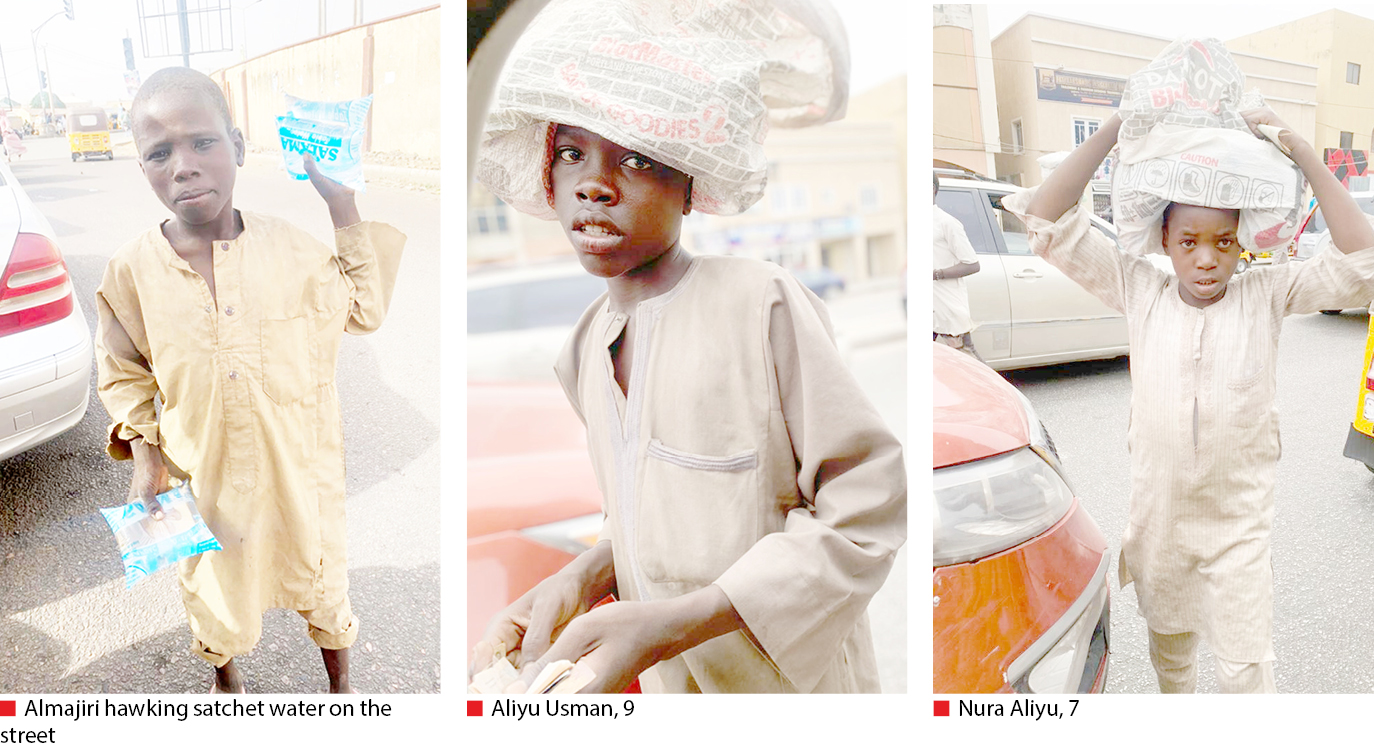Every year, children all over the world are celebrated on May 27 with several activities, but thousands of children in Kano State which form a huge part of the country’s out-of-school children have no reasons to join in the celebration. From not knowing about the day to already living their lives as adults, these children wonder why their lot in life is different. Daily Trust Saturday reports on the negative impact of the wrongful application of the Almajiri school system on the mental health of the children.
Walking under the scorching sun on the streets of the Kano metropolis is a young child who is supposed to be in either a classroom or at home with his family. He was hawking sachet water in traffic without shoes and wearing only torn and dirty clothing. He roams around in traffic, chanting “Buy pure water”, but only a few patronise him due to his physical appearance as passers-by consider him too dirty to hawk anything edible.
The young child, Nura Aliyu, 7, who came to Kano at the age of five from Sokoto State, was brought to Kano by his father for Islamic education known as Makarantar Allo or the Almajirci. Though he came here to learn, Aliyu is battling for what to eat, as his parent didn’t bring him any food or money to take care of him.
Like Aliyu, many other children are currently facing similar challenges as their parents have sent them away from their houses to several places in the name of acquiring knowledge. They felt abandoned, alone, without the care of a parent, which is a great pillar in a child’s upbringing.
“I have been sleeping in a nearby farm where vegetables are grown. For the past 5 years, I have been battling for food to eat. I don’t have clothes, I only bathe once a week, if I get soap and that is usually on Fridays. Our teacher doesn’t give us food, and we are expected to bring food or money back home from the one we gather. They don’t even care if we study, pray or take good care of our health,” another 9-year-old Almajiri, Aliyu Usman, who came from Zaria, Kaduna State, said.
Every May 27 is set aside to celebrate children all over the world, but thousands of children like Aliyu and Usman are not aware of this celebration.
The menace introduced by the wrong application of the Almajirci system has been on the rise across northern Nigerian states, government officials and child rights activists have observed. Parents send their children to different states. This has paved the way for child labour to remain a major issue in Nigeria, especially in the northern region. Children of young age who are supposed to be in school or under close supervision from their parents are sent to do domestic service, beg, or hawk on the streets.
In Kano, the system as a traditional method of learning the Holy Qur’an exposes children to exploitative labour, residents and experts have said. Over the years, this has been seen to contribute to and encourage the high growth rate of child abuse and out-of-school children in the state. Boys are sent away from their families to religious teachers, who cannot provide for their basic needs and who in turn send them into the streets to fend for themselves.
These children are usually found everywhere on the streets of Kano either begging for alms, doing petty jobs like washing cloths and plates in exchange for food or hawking water, soft drink, and snacks, washing the windshields of cars in traffic for a little amount to survive on a daily basis.
The United Nations Educational, Scientific and Cultural Organisation (UNESCO) cites that the total of Out-of-School Children (OSC) in Nigeria is more than 20 million, whereas the Universal Basic Education Commission (UBEC) states it is slightly above 10 million. According to UNESCO, the data is based on those aged six to 18 years, ranging from Primary One to Senior Secondary School three (SSS III), while UBEC’s figure is related to those aged six to 11. Whatever numbers one looks at, the reality remains that Nigeria has one of the highest numbers of OSC in the world, educationists said.
The Child Right Act, which was signed into law in Nigeria on July 31, 2003, and came into effect on October 20 of the same year, provides among other things for the human rights of a child, including the right to survival, development, and protection. It also sets out obligations for parents, the government, and society in general to promote and protect the welfare of children. The Act also criminalises child trafficking, child labour, child abuse, and other forms of violence against children.
However, almost 20 years down the line since the Act was enacted, there has been increased advocacy for the rights of children and protection against violations of these children in Nigeria and yet the numbers of people engaged in this criminal act are growing on a daily basis.
Narrating their ordeals further, the young ward, who was brought from Sokoto State, Nura, lamented how his father used the Almajiri system as an excuse to send him and his sibling who are all boys above the age of five out of the house in order to make room for his new bride.
He lamented on his daily struggles on the streets of Kano and how he has to be under the scorching sun for hours to afford a meal. He said every day he has to beg or work for people; and on some days he makes little or nothing at all. According to him, in the school where their Mallam (teacher) keeps them, there are up to 40 children in a room and most times when the weather is hot, they are forced to sleep outside where they are exposed to mosquitoes.
“We are not given food and clothes, we depend on kind-hearted people to give us food and clothes which are most times above our sizes and food that are bad,” another Almajiri, Umar Suleiman, said.
From the interviews, Daily Trust Saturday observed that the children were unhappy going through such adversity for children their age. They face trauma and pressures beyond their brains’ capacity and comprehension.
Meanwhile, a cleric, Ashiru Muhammad, who also owns an Almajiri school, said the only way this issue can be addressed is if more schools are created and the government works with the private owners to ensure that these children are well taken care of, “because if we continue like this – leaving these children to roam the street and sleeping at any convenient place they find, it will continue to increase the rate of crime which is already high as we speak.
“People are no longer safe to move about as usual because they are scared their phones or valuables will be snatched by hoodlums. This is what we should avoid and ensure these children do not grow up to be like this.”
He also criticised parents for sending their children to these schools “without sending food, clothes and money to take care of their wards. They mostly force them (the schools) to exceed the number of pupils they are supposed to take.”
Muhammad owns an Arabic school in Kano with about 250 students under his care. He said most of the parents of these children send them without food and cloth and the burden is always too heavy on him as there is no assistance from anyone.
“There is an arrangement on how my students sleep in order not to inconvenience others and if it seems impossible for them all to sleep in a place, I asked the rest to sleep outside where mosquito nets are made available for them. For provision of water, there is a well beside my house and a big drum inside from which they drink after eating,” he added.
He said he “occasionally” provides food for the children but “most times they go out to get food for themselves.” He further said that he didn’t see this Almajiri system as a demerit but as a big achievement as they are opportune to learn Islamic education if it is done properly.
“Nothing good comes easy. You have to struggle in order to accomplish your aims,” he said on the challenges the children have to surmount.
In 2021, the Kano State Government established three Tsangaya schools for the integration of Almajiri system of education into the western education system.
Governor Abdullahi Ganduje, while commissioning the schools, said they were established following the decision taken by the government to ban Almajiri system and return all the Almajiris in Kano State to their respective states of origin.
“The three Tsangaya schools built are for Kano State Almajiris who were returned to Kano from other states. So far, we have selected 100 of such Almajiris, given them admission into the schools and provided them with all their needs, including accommodation, uniforms and books,” he said.
Ganduje, who decried the Almajiri system of education, said the Kano State government would continue to sustain its free and compulsory education policy, as well as the integration of Almajiri education into the conventional system to give the children the opportunity to acquire both Islamic and western education at the same time.
But despite the efforts and several declarations by the government, out-of-school children, especially those engaged in street begging and hawking, seem to be on the rise in the state. A reason the government and residents have adduced to this has been that because of the commercial nature of the state, parents from other states bring their wards to Kano with the hope that after the “completion” of their Almajiri education, they would be able to make something out of their lives from the abundance of opportunities the state offer.

 Join Daily Trust WhatsApp Community For Quick Access To News and Happenings Around You.
Join Daily Trust WhatsApp Community For Quick Access To News and Happenings Around You.


